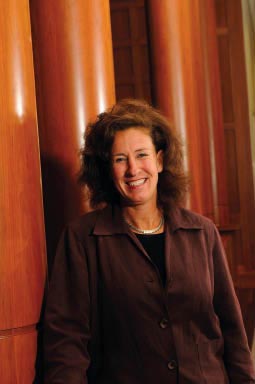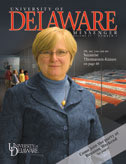Targeted marketing scores points with fans

ALUMNI | If you can tap into the loyalty and passion of true sports fans, you can convert their powerful emotions into positive feelings for a particular brand of merchandise or services. How to harness those fans’ passions was at the heart of the message that Lisa Murray, CHEP ’80, delivered recently to sport marketing students in the College of Health Sciences.
For Murray, it’s not just an opinion; it’s her profession. She serves as executive vice president and chief marketing officer of Octagon Worldwide, an internationally known sports sponsorship agency.
Honored by the Sports Business Journal and The Sporting News as one of the most influential women in the field, Murray visited the UD campus to share some insights gained during her 20-year career in the sports business.
“Sports marketing nowadays has to fit into a 360-degree marketing mix,” she said, explaining that a major sponsorship decision can’t be justified, much less measured, based on the whim of a senior executive. “It’s too expensive to be just a sign at a baseball game.”
With more than 900 employees in 22 countries, Octagon has assembled a robust database to better help clients understand sports fans, Murray said. In addition, she said, her firm has taken its research methodology to a new level to determine why fans are fans and to quantify this aspect of them.
“Once you know the why, you’re going to market to fans in a different way,” she said. “People are fans for different reasons, and clearly understanding those differences can allow you to create more effective and efficient sponsorship leveraging programs.”
As an example, she said, there are fans who follow a particular football or basketball team no matter who its players are, but there also are fans of specific athletes who feel a personal connection regardless of the teams for which they play.
“In order to reach those player fans,” Murray said, using basketball star LeBron James as an example, “a savvy marketer might devise a sweepstakes giving the winner the opportunity to meet James in person or to have his voice as their morning wake-up call.”
Baseball fans, she says, often are uniquely motivated by nostalgia, so marketing campaigns targeted to them might be designed to evoke memories of great teams, players, games and ballparks of the past.
“Everything is about engaging the consumer,” Murray said. “Fans have a bond with sports, and that passion can be harnessed through sponsorship to connect a sports fan to a product or service.”
Murray graduated from UD with a degree in home economics and an interest in communications and consumer behavior. “I wanted to be Ralph Nader,” she says. She was working at a public relations firm in Atlanta in 1989 when she and two colleagues started their own sport marketing agency. The startup’s success, propelled by the partners’ hard work and the 1996 Olympic Summer Games, led to the agency’s purchase by Octagon.
In her years with Octagon, Murray says she has had the opportunity to experience every aspect of the sports business, from installing banners to training concession-stand workers to escorting celebrity spokespersons on media tours. Today, she focuses on her primary role of developing new business.
“It’s a tough business, and there are the demands of long hours and frequent travel,” she says. “But it’s a fascinating business, and it’s fun. You might be working all through the weekend, and then you realize where you are—at a bowl game, a NASCAR race or even the Olympics.
“You may not always get to see the event, but you get an adrenaline rush like there’s no tomorrow, and you get to work with great people. I could not have asked for a better career.”
Article by Ann Manser, AS ’73





